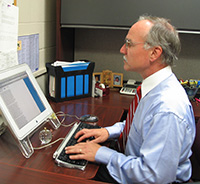What are the roles and responsibilities of school counselors when working with students with disabilities?
Page 6: Make Referrals to Outside Agencies
 To make a referral involves sending a student to another professional for services to support academic, social, or behavioral needs. Ethically, Mr. Hunter should make referrals to other professionals if he does not possess the requisite knowledge or expertise to himself effectively intervene. For example, Mr. Hunter has a student with Down syndrome who is looking for a job, but Mr. Hunter has never worked with a student with Down syndrome before. He should consult with a local agency, one which specializes in working with students with intellectual disabilities and related developmental disabilities and their families. Although the referral source might provide the bulk of the support, Mr. Hunter will continue consulting with the agency’s staff, who are trained to provide extensive support in career planning for students with developmental disabilities. As the primary advocate, Mr. Hunter will continue in a collaborative role between the agency and the student, teachers, parents, and other school personnel, while avoiding duplicating services.
To make a referral involves sending a student to another professional for services to support academic, social, or behavioral needs. Ethically, Mr. Hunter should make referrals to other professionals if he does not possess the requisite knowledge or expertise to himself effectively intervene. For example, Mr. Hunter has a student with Down syndrome who is looking for a job, but Mr. Hunter has never worked with a student with Down syndrome before. He should consult with a local agency, one which specializes in working with students with intellectual disabilities and related developmental disabilities and their families. Although the referral source might provide the bulk of the support, Mr. Hunter will continue consulting with the agency’s staff, who are trained to provide extensive support in career planning for students with developmental disabilities. As the primary advocate, Mr. Hunter will continue in a collaborative role between the agency and the student, teachers, parents, and other school personnel, while avoiding duplicating services.
Referral Steps
Making a referral involves more than a simple phone call. Ideally, the process should involve four steps:
Recognize the need to refer a student: Counselors should know their limitations and monitor their actions to ensure that they don’t provide services beyond the scope of their training. |
Evaluate potential referral sources: Counselors should gather information about the experiences and capabilities of the individual they have chosen to provide services to the student. |
Prepare the student and his or her parents for the referral meeting: Topics to discuss might include the types of services provided by the referral source and why the counselor believes the referral to be necessary. |
Help coordinate services to outside referrals: This would include setting up an introduction and an ongoing collaborative relationship between the agency and the student. |
Keep in Mind
Finally, a word of caution: Counselors’ limited expertise in certain areas may tempt them to take a hands-off approach by completely handing over their students to other professionals. Keep in mind that, as primary advocates, school counselors adopt consultative roles in which information from the referring agencies is communicated to the students, their families, and school personnel.
Activity
 Read about one of Mr. Hunter’s students and write brief answers to the questions below.
Read about one of Mr. Hunter’s students and write brief answers to the questions below.
Alex is a 15-year-old student who has Down syndrome, an intellectual disability. He spends the majority of his day in a pull-out program where the course content focuses on basic life skills. Alex interacts well with his peers and with adults, but he struggles to understand basic concepts such as counting money and has difficulty with time management and organizational skills. Alex’s special education teacher has made an appointment with Mr. Hunter to talk about career planning for Alex. Although Mr. Hunter is knowledgeable about career development and regularly works with students regarding career and college planning, he is not confident that he has the skills or knowledge to assist Alex with specialized evaluations and assessment.
- Who would be able to provide this training to Alex?
- What steps might Mr. Hunter take to help Alex and his parents during the referral process?

Amy Milsom, PhD
Assistant professor
The University of North Carolina at Greensboro
Department of Counseling and Educational Development
- Who would be able to provide this training to Alex?
Given Alex’s needs, he would most likely need some sort of job-training program. A vocational rehabilitation counselor is skilled in assisting individuals with disabilities in job training.
- What steps might Mr. Hunter take to help Alex and his parents during the referral process?
In keeping with the four steps listed above, here is how Mr. Hunter might proceed with Alex’s referral:
- Step 1: Recognize a need to refer—Mr. Hunter has already decided that he does not have the skills and knowledge to assist Alex in his job training.
- Step 2: Evaluate referral sources—There are several ways to locate a rehabilitation counselor:
- First consider whether former students have worked successfully with a rehabilitation counselor in the past. Mr. Hunter might contact that person again.
- An office of vocational rehabilitation (OVR) in the area could help Mr. Hunter to find a rehabilitation counselor.
- Recommendations might be obtained from school counselors in surrounding school districts.
- Step 3: Prepare the student and parents—After identifying a rehabilitation counselor, Mr. Hunter could set up a meeting with Alex, his parents, and his special education teacher in order to discuss the need for and purpose of the referral.
- Step 4: Help coordinate services to outside referrals—Mr. Hunter could volunteer to coordinate the introductions, possibly inviting the rehabilitation counselor to come to the school (rehabilitation counselors frequently provide school-based services). Mr. Hunter might then follow up with the parents and teacher to ensure that the services are being carried out as expected.